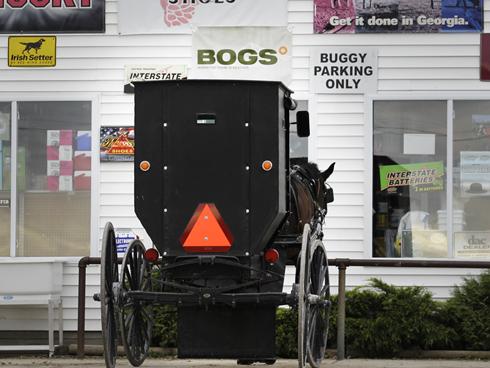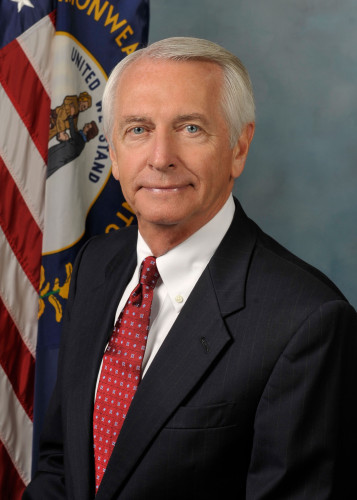It is official. This July Kentucky’s brand new Religious Freedom Restoration Act (RFRA) will go into effect. The state’s legislature put its final stamp of approval on the bill when it overturned, by a wide margin, Governor Steve Beshear’s veto on March 26th.
Originally called House Bill 279 (HB279), Kentucky’s RFRA states:
Government shall not substantially burden a person’s freedom of religion. The right to act or refuse to act in a manner motivated by a sincerely held religious belief may not be substantially burdened unless the government proves by clear and convincing evidence that it has a compelling governmental interest in infringing the specific act or refusal to act and has used the least restrictive means to further that interest. A “burden” shall include indirect burdens such as withholding benefits, assessing penalties, or an exclusion from programs or access to facilities. – Kentucky HB279 Draft as of 4-4-2013
At first glance this sounds great. The state of Kentucky cannot “burden” a person’s freedom to practice his or her religion or limit the right to act or to refuse to act due to “sincerely held religious beliefs.” Pagan children can miss school on Samhain. If one’s jury duty falls on Beltane, we can ask to be excused.

By Amy Sancetta, AP
Source: USA Today
Before everyone packs their bags and moves to Kentucky, let’s take a closer look. State Rep. Bob Damron, a conservative democrat from Nicholasville, sponsored HB279 after the Kentucky Supreme Court upheld a ruling concerning the Amish community. In 2008, nine Amish men were arrested after refusing to comply with a state law requiring reflective orange triangles on their buggies.
The local chapter of the ACLU defended these men stating that, “This case is about the right of Kentuckians to freely exercise their religious beliefs and by necessity the limits of government’s ability to impose a substantial burden on that right.”
However, when HB279 was brought before the legislature, the ACLU didn’t support it. On March 11, the organization stated, “though laudable in its purpose, the bill as currently drafted, would undermine existing civil rights protections in the Commonwealth.”
 Governor Steve Beshear’s agreed. Upon vetoing the bill, he stated:
Governor Steve Beshear’s agreed. Upon vetoing the bill, he stated:
I appreciate the good intentions of House Bill 279… However, I have significant concerns that this bill will cause serious unintentional consequences that could threaten public safety, health care, and individuals’ civil rights… The bill will undoubtedly lead to costly litigation.
HB279’s opponents fear that its language provides residents with the legal power to disregard state laws in the name of religion. Governor Beshears said, “Imprecise legal standards lead to unforeseen consequences.” He cites various areas where problems could arise including: civil rights, school curriculum standards, economic development efforts, public health initiatives and drug enforcement. For example, a science teacher might refuse to teach evolution or choose to teach creationism. Prayer could enter government meetings. The implications are endless.
Local Kentucky Priestess Nancie Clark of Spirit of the Earth Church said:
This law is deeply concerning to me on multiple levels and I am certain it is more than likely being pushed by those with their own religious agendas… I can foresee many fellow Kentuckian’s personal liberties being chipped away in subtle ways throughout pockets of this state. What saddens me is that many people here may not be aware of just how this law will affect them until of course something happens to them or someone they love.
Oberon Osiris, co-Public Information Officer of Covenant of the Goddess’ Midwest Regional Local Council, echoed those sentiments adding “For Pagans and other minority religions, this law could create strained relationships and conflicts in the overall community.”

Priestess Nancie Clark
Specifically, opponents, like Priestess Clark, are concerned about the Fairness laws protecting gay, lesbian, bisexual and transgendered citizens. HB279 could render these city-based ordinances completely useless. Priestess Clarks adds, “What’s to stop a teacher or other mentor from preaching to a gay teen the error of their ways according to scripture? This law helps to legalize bullying.”
Despite all objections, the bill’s supporters including Family Foundation of Kentucky, the Catholic Conference of Kentucky, and the Kentucky Baptist Convention, maintain the bill’s only goal is to protect religious liberty. State Rep. Stan Lee, R-Lexington said:
It wasn’t so long ago we had prayer in the schools, but they made us take it out… There have been attempts to take God out of everything. They want to take God out of the pledge of allegiance, can you believe that? You don’t think your religious freedom is under attack? Then maybe you do believe in a boogeyman….
But are Rep. Lee and the other supporters really concerned with protecting religious liberty? Or is this just a back-door attempt to re-establish government-sanctioned religious practices?
Interestingly, Kentucky isn’t the only state with an RFRA. In fact, in 1993, the Federal Government enacted its own RFRA which was eventually struck down by the Supreme Court as being unconstitutional. Justice Stephens said:
In my opinion, the Religious Freedom Restoration Act of 1993 (RFRA) is a “law respecting an establishment of religion” that violates the First Amendment to the Constitution.
Since 1993, 16 states have some form of RFRA and the Federal government has a new more restrictive version. Professor Christopher Lund of Wayne State University studied these laws in great detail and found them to be ineffective and unnecessary. His reports show that only three of the states (Florida, Illinois and Texas) have significant instances of litigation related to their RFRAs.
So why be concerned? Kentucky’s bill is touted as much broader in scope using “imprecise” language. In addition, Kentucky is proving to be a very conservative environment. Outside of this initiative that passed by a landslide. The state’s Department of Homeland Security requires all of its training materials to include the statement: “the safety and security of the commonwealth cannot be achieved apart from reliance upon Almighty God.”

Kentucky State Seal
When it comes to RFRAs, there is always one lingering question: Why bother? Isn’t religious freedom already guaranteed by both the Kentucky and U.S. Constitutions? As best expressed by Democratic state Rep. Darryl Owen, “This is a piece of legislation looking for a reason.”
As always, Lady Liberty League will be watching the situation closely. Selena Fox stated:
Religious Freedom is an important foundation for the United States. We need to be vigilant, guard it, preserve it, and uphold it. However, as part of this work, we also need to closely examine political crusades and legislation that are put forth in the name of “Religious Freedom.” Just because something is proclaimed to be about “Religious Freedom” does not make it so. It is an affront to Freedom to pass and implement laws, whatever they are called, that can permit religious dogma and opinion to override Liberty and Justice for All.
In less than 90 days, HB279 will become a law. Whether civil liberties will be trampled in the name of religious freedom has yet to be seen. All we can do is wait and see.
(Note: The 16 states with RFRAs include Connecticut, Florida, Illinois, Rhode Island, Alabama, Arizona, South Carolina, Texas, Idaho, New Mexico, Oklahoma, Pennsylvania, Michigan, Virginia, Utah and Tennessee.)
The Wild Hunt is not responsible for links to external content.
To join a conversation on this post:
Visit our The Wild Hunt subreddit! Point your favorite browser to https://www.reddit.com/r/The_Wild_Hunt_News/, then click “JOIN”. Make sure to click the bell, too, to be notified of new articles posted to our subreddit.
How about all non-Christians move away from these backwards-ass states and let them crumble?
I live in west Kentucky and I attend Spirit of the Earth — I won’t speak for all of the members, but the reason I stay is the land. Everything is so spread out and beautiful, we have the ability to have privacy while staying outside. Priestess Nancie also has amazing ties to the local community; I’ve never experienced any animosity myself, and I understand it’s been extremely rare in the Church’s history before I joined. We’re all just hoping that this new ‘law’ won’t be affecting our amazingly blessed situation. I don’t think it will, but there is always a chance.
That would be when you all invoke the law because those who harass and try to prevent you from practicing your own religion would be in violation of it.
And I bet that that would be the situation that would lead to this law being repealed–when those so hot for it suddenly realize that even this applies to ALL religions.
It’s a shame PA makes the list, as early on in this country, they were one of the first states to embrace actual religious freedom! But I can see why… there’s an old saying about PA: “It’s Pittsburgh and Philly with [Ala]bama in the middle!” And we’ve been gerrymandered to favor the ‘Bama, unfortunately.
I was wondering, Heather, if you had come across the specific states’ versions of the RFRAs. When I saw PA was on the list, I tried – unsuccessfully – to search for our specific wording and current status. All I came up with after a dozen different google searches was the Federal version of the law that was struck down, and the listing of states that appear at the bottom of your article. (Not to mention a few fundie sites that praise and campaign for such laws…)
The full title of the Pennsylvania act is RELIGIOUS FREEDOM PROTECTION ACT Act of Dec. 9, 2002, P.L. 1701, No. 214. Interestingly, searching on the exact name fails to find a link to any PA gov website. It was first tested in a court case in Philadelphia: http://www.aclu.org/religion-belief/pennsylvania-judge-upholds-muslim-firefighters-religious-liberty-aclu-lawsuit
They are not all called Religious Freedom Restoration Act. PA is from 2002. Here is what appears to be the actual legislation.
http://www.legis.state.pa.us/WU01/LI/LI/US/PDF/2002/0/0214..PDF
Start carrying an axe and, when someone confronts you about it cry “dishonour” and cleave the Christian in twain.
I believe you’d have religious exemption now…
Or as Crowley put it, “The Christians to the lions.” So maybe we should acquire a few lions. After all, down deep, a lot of those Christians want to become martyrs and go directly to heaven. Why not help them achieve their religious exemption.
Based on the above quote from Representative Lee, I’d say that it’s more a “front-door” attempt to re-establish government-sanctioned religious practices. School prayer, the pledge of allegiance, this is the same old battlefield to protect THEIR religious freedom, screw everyone else’s.
There are in fact genuine cases of Christians facing discrimination due to
overzealousness and even outright bigotry on the part of some atheists
and secularists. When Francis Collins was nominated by President Obama
to be the Director of NIH, Sam Harris openly called for Collins to be disqualified on the basis of his religious beliefs. And in the UK there have been at least two cases where employees were fired simply because they wore (small and unobtrusive) Christian crosses around their necks.
In fact, Sam Harris, Richard Dawkins and others have gone so far as
to openly question whether or not “religious freedom” is a valid concept
at all, since they view religion itself as a kind of mental illness. Harris has even made it clear that he considers those who believe in things like “witchcraft, astrology and tarot cards” to be even more dangerous than evangelical Christians like Collins.
For the most part claims of “discrimination” coming from Christians
are bogus. But in my opinion Pagans must be meticulous in defending any
and all victims of genuine discrimination, including evangelical Christians, when there is real evidence of actual discrimination. We should also make ourselves aware of this disturbing trend among “new atheists” who wish to radically revise the very notions of liberty and human rights to no longer include religious freedom.
Wow. It seems so wild that one has to be so utterly vigilant with laws that at first seem inclusive but could be used for just the opposite.
Just means the oppo includes some smart folks. We need to be smarter.
Chicanery in legislation is an ancient and high art form. I spent a good part of a year covering state government in Illinois, and one of the hardest parts of the job was following legislation through its arcane life cycle and discerning what the language actually meant.
The big dollar important stuff like taxes and budgets and crime bills would start life as a “shell bill” about some facetious obscure amendment to some pension regulation. Then it would be gutted and replaced in various committees and shape shift more times than Gwion Bach. Invariably, the most onerous and oppressive bills would end up with some sunny euphemistic title.
It’s a hell of a shell game, and it’s no accident that even lawmakers themselves lose track of the pea. It’s terrifying how even monumental stuff, like the Patriot Act, get voted on by lawmakers who haven’t even had time to read the text of the bill.
One of the surest ways to sus out the real intent of this stuff is to examine the sources of money and support behind the thing. When the “10 Commandments in Schools and Let’s Declare a State Religion” crowd takes a sudden interest in “religious freedom”, it’s a sure bet they have a different idea of what that means than you or I or the ACLU.
Will civil liberties be trampled in the name of religious freedom? Of course they will, up until the point that courts intervene. It’s the transparent intent of the crafters of this legislation. These “religious freedom” bills, are code for “An Act to Exempt Christians from the Rule of Law.” It’s about upholding freedoms in the same way that “states rights” was.
Missouri has an amendment in it’s constitution under the Bill of Rights called “Religious Freedom — liberty of conscience and belief — limitations.” http://www.moga.mo.gov/const/A01005.HTM
“Religious freedom–liberty of conscience and belief–limitations.
Section 5. That all men and women have a natural and indefeasible right
to worship Almighty God according to the dictates of their own
consciences; that no human authority can control or interfere
with the rights of conscience; that no person shall, on account
of his or her religious persuasion or belief, be rendered
ineligible to any public office or trust or profit in this state,
be disqualified from testifying or serving as a juror, or be
molested in his or her person or estate; that to secure a
citizen’s right to acknowledge Almighty God according to the
dictates of his or her own conscience, neither the state nor any
of its political subdivisions shall establish any official
religion, nor shall a citizen’s right to pray or express his or
her religious beliefs be infringed; that the state shall not
coerce any person to participate in any prayer or other religious
activity, but shall ensure that any person shall have the right
to pray individually or corporately in a private or public
setting so long as such prayer does not result in disturbance of
the peace or disruption of a public meeting or assembly; that
citizens as well as elected officials and employees of the state
of Missouri and its political subdivisions shall have the right
to pray on government premises and public property so long as
such prayers abide within the same parameters placed upon any
other free speech under similar circumstances; that the General
Assembly and the governing bodies of political subdivisions may
extend to ministers, clergypersons, and other individuals the
privilege to offer invocations or other prayers at meetings or
sessions of the General Assembly or governing bodies; that
students may express their beliefs about religion in written and
oral assignments free from discrimination based on the religious
content of their work; that no student shall be compelled to
perform or participate in academic assignments or educational
presentations that violate his or her religious beliefs; that the
state shall ensure public school students their right to free
exercise of religious expression without interference, as long as
such prayer or other expression is private and voluntary, whether
individually or corporately, and in a manner that is not
disruptive and as long as such prayers or expressions abide
within the same parameters placed upon any other free speech
under similar circumstances; and, to emphasize the right to free
exercise of religious expression, that all free public schools
receiving state appropriations shall display, in a conspicuous
and legible manner, the text of the Bill of Rights of the
Constitution of the United States; but this section shall not be
construed to expand the rights of prisoners in state or local
custody beyond those afforded by the laws of the United States,
excuse acts of licentiousness, nor to justify practices
inconsistent with the good order, peace or safety of the state,
or with the rights of others.”
Eric Scott, a Pagan in St. Louis, wrote about the possible implications at his blog. http://www.patheos.com/Pagan/The-Right-to-Worship-Almighty-God-Eric-Scott-06-04-2012.html So far there haven’t been any challenges in court. The problem is more about people feeling that they have superior morals or rights as Christians. This isn’t the case with every Christian of course, mainly those with a literal or orthodox viewpoint.
One example is a teacher at the local elementary school who refuses to teach the science section on fossils because she only believes in creationism and she is allowed to because that is her religious belief. Apparently it doesn’t matter that she is straying from public school curriculum.
Black is White. War is Peace. We will be greeted as liberators. Arbeit macht frei.
Just looking at the name of the bill, I have to wonder, what exactly is being “restored”? The bill assumes some religious freedom has been lost, but doesn’t spell out what that is. This makes me think that this is some political grandstanding to make the minions happy.
There are in fact genuine cases of Christians facing discrimination due to overzealousness and even outright bigotry on the part of some atheists and secularists. When Francis Collins was nominated by President Obama to be the Director of NIH, Sam Harris openly called for Collins to be disqualified on the basis of his religious beliefs. And in the UK there have been at least two cases where employees were fired simply because they wore (small and unobtrusive) Christian crosses around their necks.
In fact, Sam Harris, Richard Dawkins and others have gone so far as to openly question whether or not “religious freedom” is a valid concept at all, since they view religion itself as a kind of mental illness. Harris has even made it clear that he considers those who believe in things like “witchcraft, astrology and tarot cards” to be even more dangerous than evangelical Christians like Collins.
For the most part claims of “discrimination” coming from Christians are bogus. But in my opinion Pagans must be meticulous in defending any and all victims of genuine discrimination, including evangelical Christians, when there is real evidence of actual discrimination. We should also make ourselves aware of this disturbing trend among “new atheists” who wish to radically revise the very notions of liberty and human rights to no longer include religious freedom.
strange. this comment of mine ended up appearing twice. my apologies for any confusion.
Disqus seems to be doing that a lot at the moment.
Anyone consider asking an actual lawyer what the deal is with this legal issue? Of course not. It’s way more exciting to freak out about things you don’t know anything about.
But we do know, Kullervo. Other bills like this have surfaced in the recent past, usually in guns-n-God land, and repeatedly have meant freedom to teach creationism, harass gays, pray in school and mount the 10 Commandments on a coffin-size stone in the courthouse lobby.
Exactly.
Kullervo, the Professor cited in the article is not only a lawyer but a professor whose expertise is in religious freedom law. His response was cited in this article and I read his full report. I corresponded with him personally.
You really seem to enjoy telling people what they are and aren’t saying.